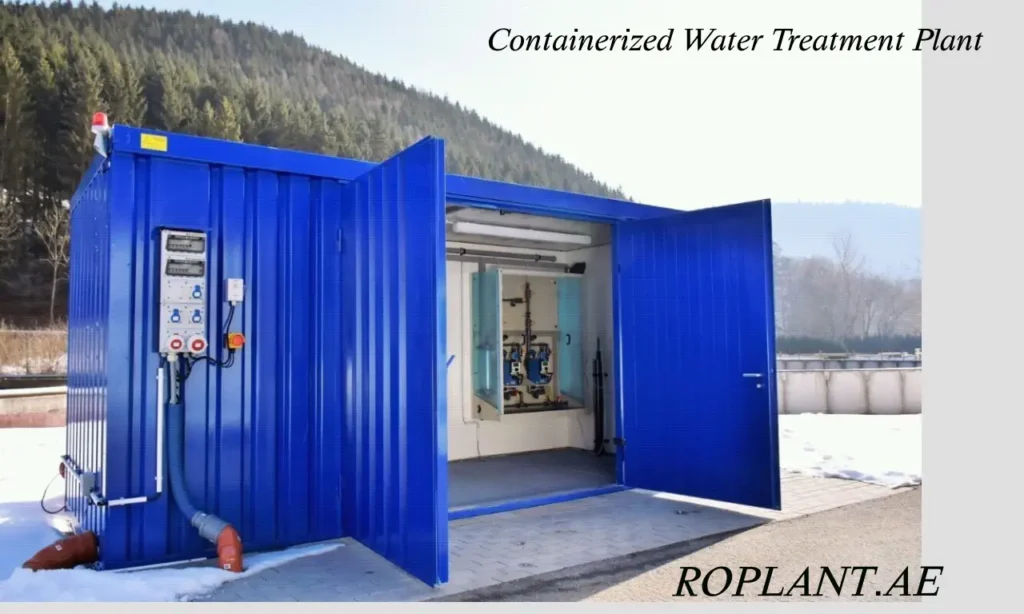Innovations in Water Treatment Solutions in the UAE: Containerized Water Treatment Plants
With the turn of 2024, water treatment solutions have begun to change significantly, largely due to an exciting new development: the advent of containerized water treatment plants. In the water-deprived regional expanses of the United Arab Emirates (UAE), these easily portable, compact plants have begun to redefine the paradigm of accessible and efficient water purification. Let’s journey into this evolutionary world of containerized water treatment and examine a variety of types envisioned to reshape water management methods throughout the UAE.
Containerized Water Treatment Plants: A Ray of Hope
Challenging the Water Scarcity Problem
The UAE grapples with low freshwater resources, constantly trying to meet the surge in demand for filtered water. The introduction of containerized water treatment plants is answering this issue strategically, owing to their mobility, versatility, and swift assembly in areas pertinently in need of water treatment machinery.
Modular Functionality
These plants employ a modular structure, nestling crucial water treatment components within a portable container. Such a modular strategy not only simplifies manufacturing and deployment but also makes it elastic enough to conform to fluctuating water treatment demands.
Types of Containerized Water Treatment Plants
Mobile Reverse Osmosis (RO) Plants:
These are enclosed within portable containers and offer a compact desalination and filtration solution. They manage to convert saline or brackish water into fresh, consumable water, making them optimal for coastal areas.
Containerized Filtering Systems:
These plants are equipped with high-tech filtration methodologies meant for the effective elimination of impurities, residues, and pollutants. They’re useful in regions where traditional water treatment structures are impractical.
Emergency Response Plants:
Quickly assembled in emergency scenarios, these plants are outfitted with the necessary water treatment mechanisms to provide immediate relief following natural catastrophes or humanitarian emergencies.
Wastewater Treatment Containers:
These are designed to treat and recycle wastewater effectively. These containers have a critical role in minimizing environmental implications and maximizing water reuse in industrial and municipal contexts.
Remote Area Water Cleaning:
Custom-made for usage in isolated, off-grid sites, these plants deliver independent water treatment options. Solar-powered alternatives further increase their sustainable use in areas with limited access to traditional energy sources.
Benefits of Containerized Water Treatment
Mobility and Swift Assembly
Such plants can be transported effortlessly to varying locations, delivering a swift and flexible answer to evolving water treatment demands.
Cost-Effective:
The modular form of these plants cuts down on construction expenses, thus establishing them as a cost-effective substitute for customary water treatment infrastructure.
Expandable:
Their modular form allows for effortless expansion, adjusting water treatment capability based on demand.
Minimized Ecological Footprint:
Often, these plants integrate top-of-the-line technologies for energy efficiency and sustainability, therefore reducing environmental repercussions.
Conclusion
Containerized water treatment plants are leading the way in innovation, prepared to bring a revolution to water management techniques in the UAE and beyond. In an area where water scarcity is a constant worry, such mobile and modifiable solutions are presenting a glimmer of hope for environment-friendly water treatment and resource handling in the years to come. As we steer through future challenges, these plants serve as an example of human resourcefulness, ensuring the crucial resource of clean water is available to everyone.
FAQs on Containerized Water Treatment Plants
Q1: What’s a containerized water treatment plant?
A containerized water treatment plant is a movable, modular water purification setup enclosed in a portable container. These plants are intended for quick deployment, scalability, and adaptability to diverse water treatment needs. They hold essential water treatment pieces and technologies within their compact confines, making them ideal for regions with limited availability of traditional water treatment machinery.
Q2: What types of such plants are there?
There is an array of containerize water treatment plants, including mobile reverse osmosis (RO) plants, containerized filtration systems, emergency response plants, wastewater treatment containers, and remote area water purification units. The design of each type is meant to meet certain water treatment demands and uses.
Q3: What’s the upside to containerized water treatment?
The upside to containerized water treatment includes mobility and swift assembly, which are good for quick responses to escalating water treatment needs; Cost-effectiveness: the modular form cuts construction costs compared to regular infrastructure; Scalability: the capacity of water treatment can be changed based on requirements; Reduced Ecological Footprint: often employing advanced methods for energy efficiency and sustainability.
Q4: Where can these plants be typically used?
Such plants have applications in a variety of settings, including coastal regions for desalinating seawater (mobile RO plants), emergency response scenarios (emergency response plants), industrial and municipal wastewater treatment (wastewater treatment containers), and remote, off-grid locations (remote area water purification units).
Q5: How can these plants contribute to sustainability?
Containeriz water treatment plants bolster sustainability by employing advanced methods for energy conservation; modularity and scalability of design reduce material and construction waste; and they offer solutions for water recycling, thereby minimizing environmental effects.
Q6: Can these plants be tailored for specific needs?
Yes, containerized water treatment plants can be custom-made to address unique needs. The modular nature permits flexibility in design, accommodating different water treatment technologies and capacities based on individual location or application requirements.
Q7: Are these plants suitable for remote areas?
Yes, they are ideal for remote areas due to their mobility and versatility, especially those powered by renewable energy sources, providing clean water in locales with limited access to regular infrastructure.
